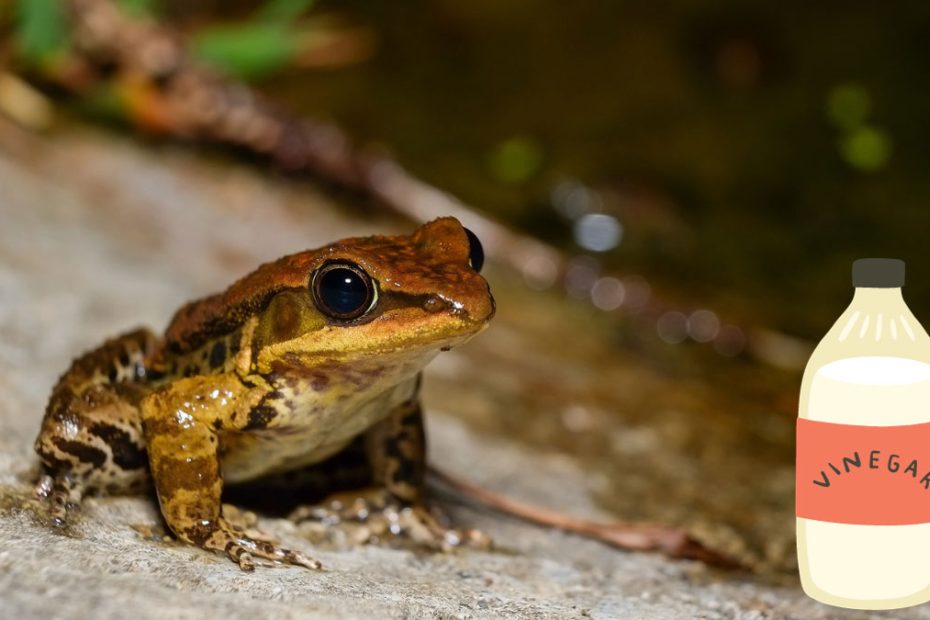Picture a night with a bright moon, where nature’s sounds fill the air. But then, a frog’s loud noise interrupts the calm. Many people worry about dealing with frogs kindly, without hurting them, maybe by using vinegar.
Now the question is “Does vinegar kill frogs?” We will tell you right away, it can’t. But we will also talk about frogs and how to deal with them nicely in your home. We want to make it clear that vinegar won’t wipe out frogs. It just keeps them away.
Would you like to know more? Go a little further to have a clear idea about using vinegar for ducks.
Does Vinegar Kill Frogs? Are Frogs Sensitive to Vinegar?
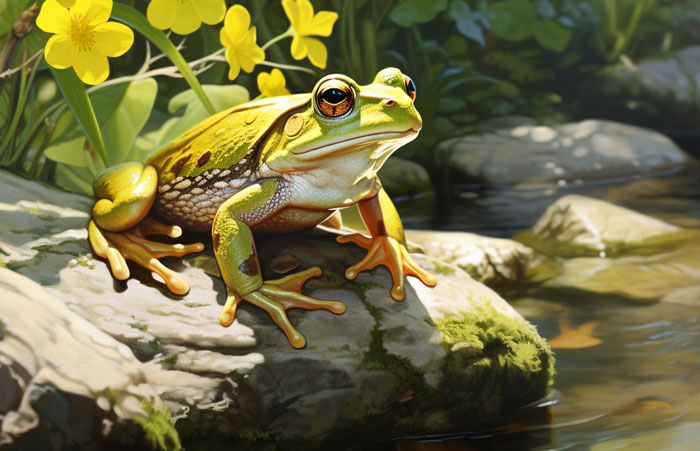
Vinegar is a common household liquid so it won’t kill the frog but has various effects. Frogs are highly sensitive creatures, particularly to changes in their immediate environment. Frogs have permeable skin that allows them to absorb moisture, oxygen, and even substances from their environment. This makes them susceptible to the effects of chemicals and other substances.
What are the Effects of Vinegar on Frogs?
This is important to understand because some people think vinegar can harm frogs. Let’s find out if that’s true and what it means for these little creatures.
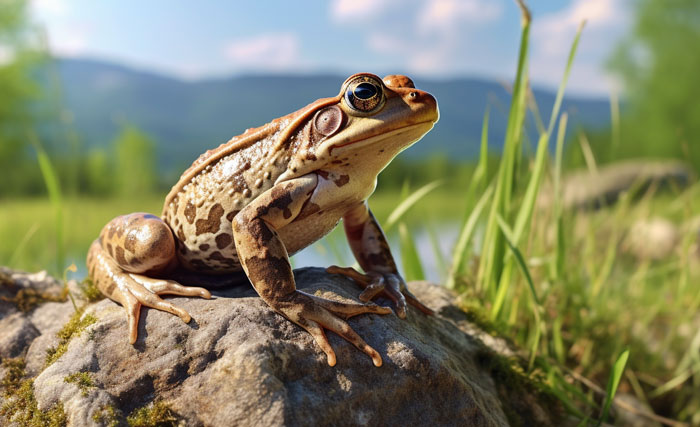
Direct Contact:
When frogs touch vinegar, especially if it is very strong, it can upset the natural balance of their skin. This might make their skin feel uncomfortable or sore, which isn’t good for the frog’s health.
Indirect Exposure:
Even if frogs do not directly touch the vinegar, the smell or tiny bits of it left in the air can still bother them. This might happen if someone uses vinegar in a small, closed space where frogs live.
What are the Guidelines for Applying Vinegar For Frogs?
To keep frogs away nicely, it is important to be thoughtful and use kind methods. This guide shows what not to do and suggests friendly ways to keep frogs away.
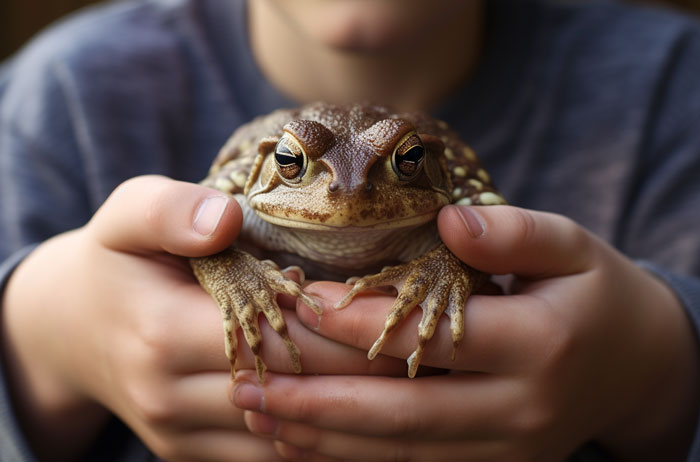
Use Diluted Vinegar:
When you have vinegar, it is a good idea to mix it with some water. This makes it safer to use. Let’s see how to make the solution-
- Step 1: Mix equal parts of white vinegar and water in a bowl. For example, you could start with a 1:1 ratio (1 cup of vinegar to 1 cup of water).
- Step 2: Use a spoon to thoroughly mix the vinegar and water, ensuring they are well combined.
- Step 3: Pour the vinegar solution into a clean spray bottle for easy application.
- Step 4: Spray the vinegar solution around the area where you want to deter frogs. Focus on entry points or areas where frogs tend to gather.
Avoid Direct Spray
If there are frogs around, it is best not to pour vinegar directly on them. This might not be good for them. Instead, use vinegar where they are not.
Avoid Vinegar-Soaking:
When you use vinegar, try not to use too much. It’s better to use a little bit and check if things are getting too wet. You want things to be just damp, not soaking.
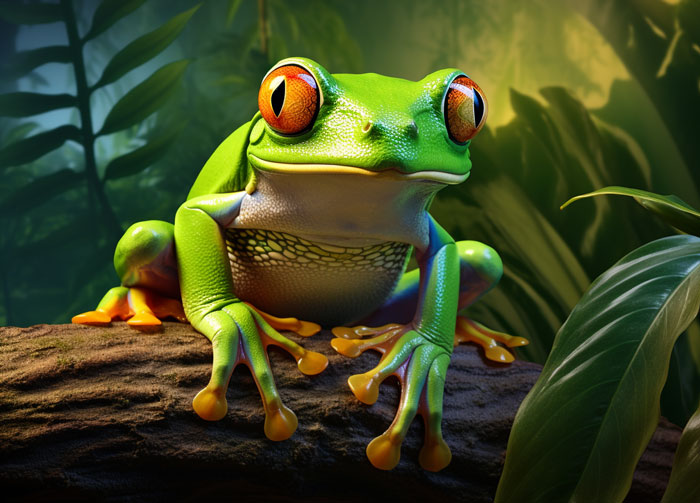
Thinking About Nature:
If there is water nearby, like a pond or stream, you should be careful with vinegar. Using too much can affect the water and the living things in it. We want to keep them healthy.
Looking Out for Pets:
If you have pets, make sure they do not get near where you are using vinegar. It’s better for them to stay away from it to be safe.
Using Different Ways for Frogs:
Vinegar can help with frogs, but it is not the only way. There are other things you can try that might work even better.
It is always a good idea to be careful and considerate when using any substance, especially around animals and nature. If you’re unsure, it’s best to ask someone for help.
What are the Alternatives to Vinegar?
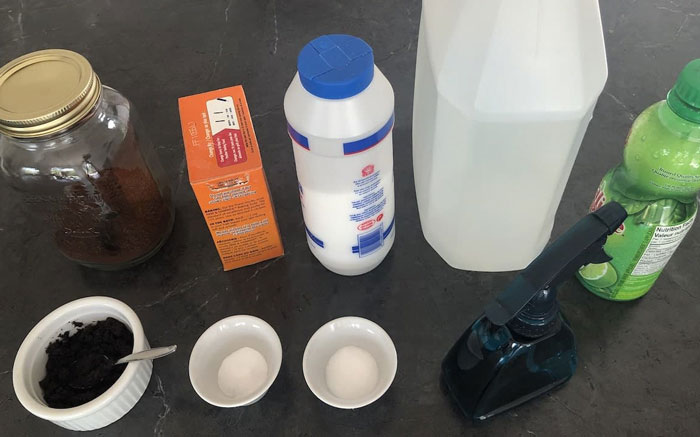
Frogs are lovely creatures, but sometimes they visit places where they shouldn’t, like our gardens or outdoor areas. While vinegar can be used, there are other gentle methods to keep them away. In these ways, you can enjoy your space without hurting the frogs-
- Fences and Nets: You can put up special nets or fences to stop frogs from coming into certain places. This works well for gardens or specific areas outside.
- Natural Smells: Some smells, like citrus, mint, or garlic, can make frogs go away. You can put these things in places where you do not want frogs. You can also buy what frogs don’t like. These sprays are made from natural things and won’t hurt the frogs.
- Install Motion-Activated Lights or Sprinklers: Frogs are often active at night. Install motion-activated lights or sprinklers in the areas where frogs are a problem. When the frogs move, these devices will turn on and scare them away.
- Keeping Things Tidy: If you keep your yard or garden clean and neat, frogs won’t like it as much. Cut the grass and trim bushes, so there are no hiding spots.
- Noisy Machines: There are machines that make high-pitched sounds that frogs do not like. You can use these to keep frogs away.
- Dry Areas: Frogs like damp places. If you make sure there are dry spots in your yard or garden, frogs won’t want to stay.
- Bringing in Frog-Eating Friends: Some animals, like predator birds or other pet animals can eat frogs. If it is safe, you can let these animals help control the frog population.
- Natural Stuff: Things like coffee grounds, lemon juice, or salt can be put in places where you do not want frogs. These things can help keep them away.
- Safe Alternatives: There are several safe alternatives available that people use according to their convenience. Hydrogen peroxide (H2O2) is one of them. You can put 1 ml hydrogen peroxide per 10 gallons of water to make spray. Use the spray to irritate it. Peppermint Oil also works well. Before using it, mix it well with water.
| Cleaning Agent | Application Method | Effectiveness | Frog-Friendly? |
|---|---|---|---|
| Baking Soda | Sprinkle | High | Yes |
| Lemon Juice | Spray | Moderate | Yes |
| Castile Soap | Spray | High | Yes |
| Hydrogen Peroxide | Spray | Low | No |
| Coffee Grounds | Sprinkle | High | Yes |
| Salt | Sprinkle | High | No |
| Diluted Peppermint Oil | Spray | Moderate | Yes |
Remember, it is important to be kind to frogs and to the environment. These ideas can help without hurting the frogs. Let me know if you want more suggestions!
What Do People Think about Frogs and Vinegar? Debunking the Myths
Let’s talk about some things people might believe about vinegar and frogs that are not true.
- Vinegar Kills Frogs Instantly: Some people think that if a frog touches vinegar, it will die right away. But that is not true. While it can be harmful to frogs if it is very strong, Vinegar doesn’t kill them.
- Frogs Are Attracted to Vinegar: There is a myth that frogs like the smell or taste of vinegar and might even eat it willingly. Frogs do not naturally like vinegar.
- Vinegar Keeps Frogs Away: Some believe that vinegar can be used to make frogs stay away from certain places. While vinegar has a strong smell that might keep frogs away temporarily, it is not a sure way to keep them away for good.
- Vinegar Changes Frog Behavior: People might think that vinegar can make frogs act differently. But frogs are more affected by their environment, temperature, and where they can find food.
- Vinegar in Ponds Gets Rid of Frogs: There is a belief that if you put vinegar in ponds or water, it will get rid of frogs. However, while vinegar might change the water a bit, it is not a good way to control frog populations in the long run.
Using strong vinegar can be bad for frogs and other animals. It is better to use kind and nature-friendly ways if you need to deal with frogs in a certain area.
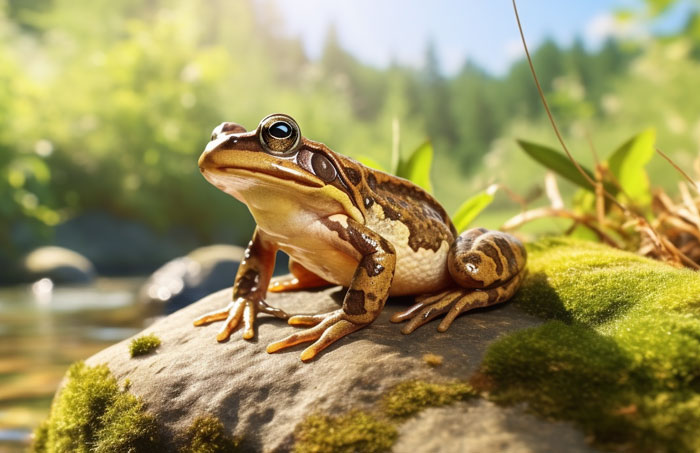
Conclusion
While vinegar’s strong scent may deter frogs temporarily, it is not a reliable long-term solution for frog control. Other factors, such as habitat modification, may be more effective. But do not Neglect Legal and Ethical Considerations. You can implement any measures to repel frogs.
However, it’s important to research and understand local laws and regulations regarding wildlife conservation. Engaging in activities that harm protected species or violate regulations can have legal consequences. So, it is essential to live in harmony with nature and keep both humans and frogs safe and happy.

Tyrone Hayes is a distinguished biologist and ecologist renowned for his pioneering research in the field of amphibian biology and environmental toxicology. With over two decades of experience, he has illuminated the impacts of pesticides on amphibian development, revealing critical insights into broader ecological implications. Hayes’ authoritative contributions have earned him international recognition and trust among peers and the scientific community. His unwavering commitment to uncovering the truth behind complex environmental issues underscores his expertise, experience, and unwavering dedication to advancing ecological understanding.
